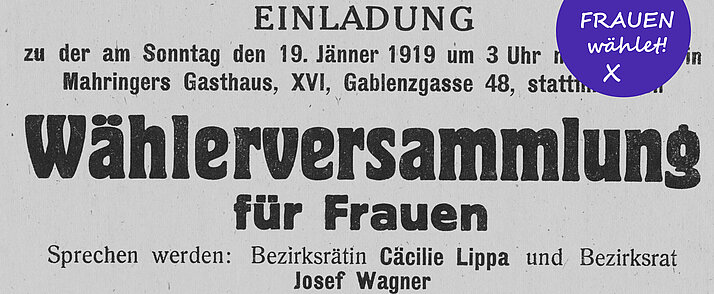Annual maintenance work will take place again this summer, which is why the reading rooms at the Heldenplatz location and in all collections will be closed from Friday, July 25, to Tuesday, August 5, 2025.
Due to the shutdown of the ordering system, no media orders can be accepted from Thursday, July 24, 2025, 4 p.m. to Tuesday, August 5, 2025, 4 p.m. The regular opening hours will then apply again from Wednesday, August 6, 2025.
The study room of the Albertina is closed from July 15 to August 15. During this time (except July 25 to August 5), media ordered from the Albertina collection will be transported twice a week (Monday and Thursday) to the reading rooms of the National Library on Heldenplatz and can be used there.
Starting August 1, 2025, the State Hall will open at 9 a.m.
Due to an event, the State Hall will be closed on August 4, 2025.
With the beginning of the First World War the activities to achieve women's suffrage were reduced. Public gatherings were prohibited during the war. From May 1917 on, when the parliament resumed work, women’s organisations submitted joint petitions for women’s suffrage. Rallies for peace and women’s suffrage, initially from the Social Democratic side and later by liberal middle-class women as well, were now on the agenda. The political turmoil generated by the Russian Revolution also affected further progress.
On November 12th 1918, after the collapse of the Habsburg Monarchy, the Republic of German-Austria was proclaimed and the Provisional National Assembly decided to grant the right to vote and to stand for election to all citizens of full age without gender discrimination. The principles for the election of the National Assembly were defined on that date in Article 9 of the Law on the Form of State and Government. Already at the end of October 1918, the Provisional National Assembly had lifted the restrictions on freedom of association and assembly. The election of the National Constituent Assembly finally took place on February 16th 1919.
Historically, the introduction of women’s suffrage is a consequence of the political and social upheaval at the end of the First World War. The decisive factors were the altered political power situation and the strong position of the Social Democrats. However women’s suffrage was also the result of the agitation by women – mainly from the Social Democratic Women’s Movement, but also from the liberal women's movement – for the opportunity to participate in politics.

